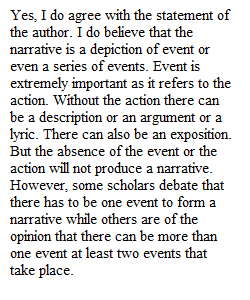


Q After reading the chapter excerpts on narration and the Scott McCloud chapter excerpts I have provided in Module 1.0, take several minutes to gather your thoughts about graphic novels (please avoid thinking of a graphic novel as a comic book). Graphic novels that are "fictitious," meaning they address a fictitious or creative interpretation of life, tell a story, just as non-graphic fiction tells a story about life. The difference is the author/illustrator of the graphic novel provides you with more details of what they want you to imagine or "see" whereas the author of the non-graphic genre gives you more freedom to create and color your own vision of the world created by the novel. In Chapter 2 of the text on narration I provided on Canvas, the author argues, "In my view the capacity to represent an event, either in words or in some other way. . . produces the building blocks out of which all the more complex forms [of narrative] are built (13). What to Do: First, once you have gathered your thoughts, write a 300 word post explaining why you agree or disagree with the above quote and whether you agree it applies to graphic novels. Use short examples from your own life narratives or The Surrogates to illustrate your contribution to this conversation. Feel free to explore this concept, remembering that all art interprets life, interprets human responses to life. Second, continue the conversation by engaging with at least two other students with 150 word (minimum) replies to their comments. Your initial post is due by 11:59pm Wednesday, January 26 and your replies by 11:59pm Friday, January 28. Please see the rubric (link in upper right corner) to understand the grading for discussions.
View Related Questions